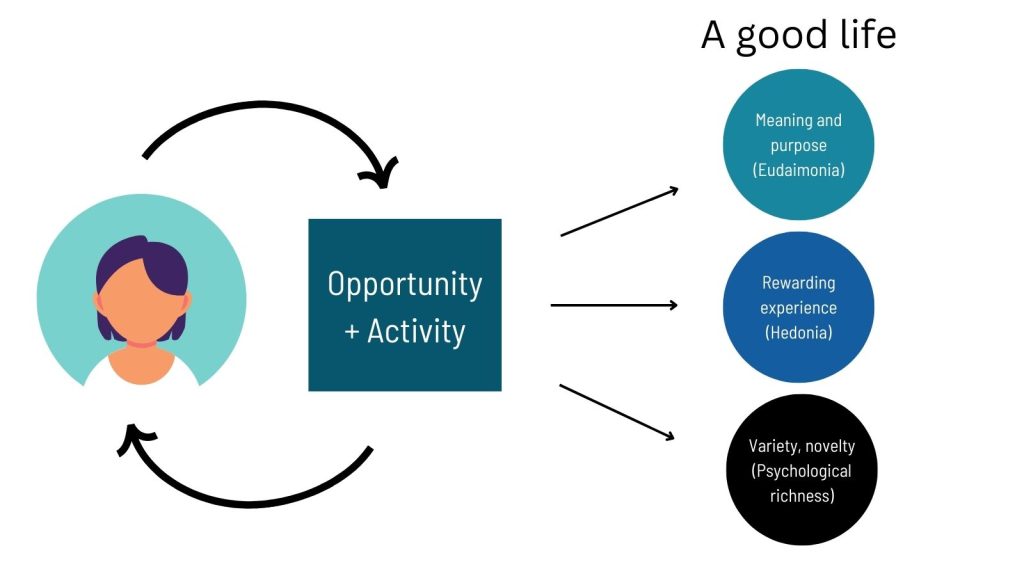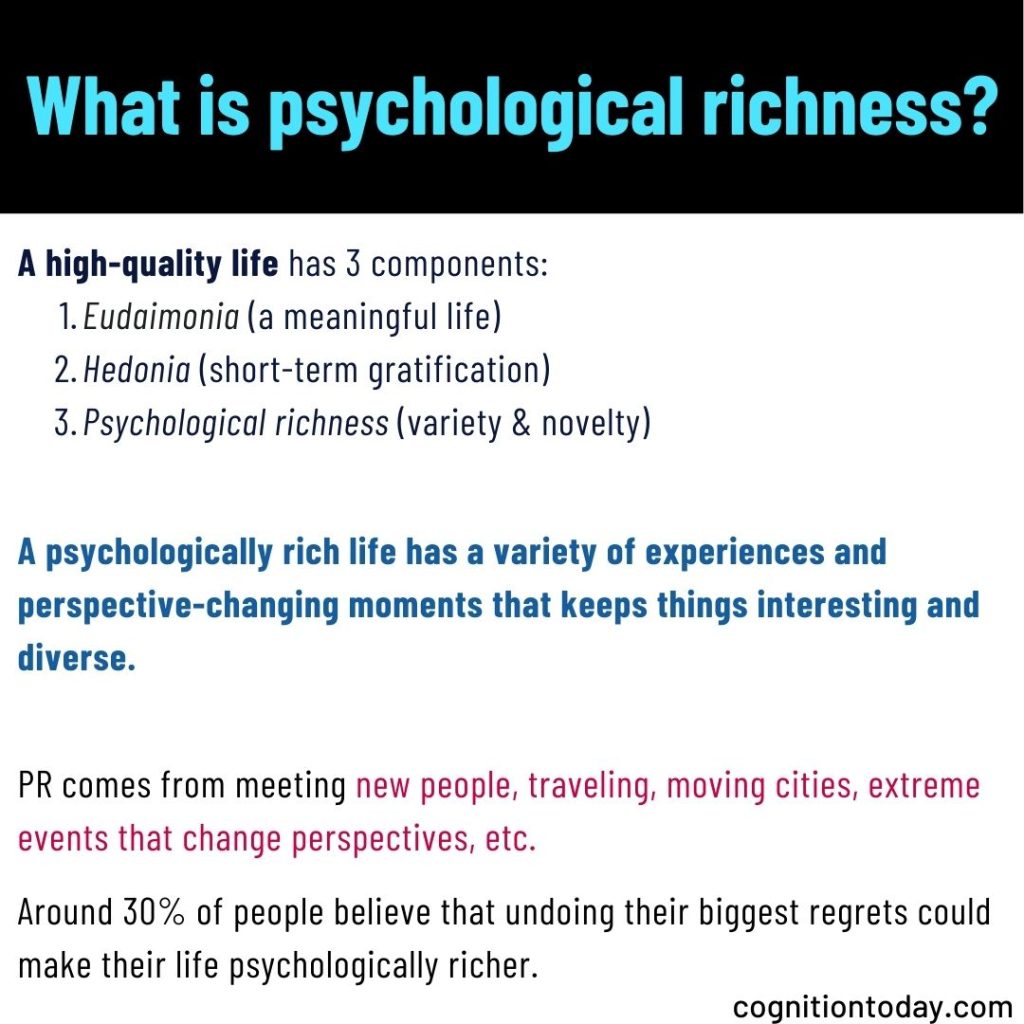Psychological richness is 1 of 3 primary components of a good life[1] and overall well-being. The other 2 are eudaimonia and hedonia.
Eudaimonia (pronounced U-die-mow-nee-ya) refers to realizing one’s potential and finding meaning and purpose in life. Hedonia (pronounced Hay-doni-ya) refers to instant gratification and seeking rewarding experiences. Both aspects of happiness aren’t enough for a good life. We need more; we need psychological richness.
A good life is hard to define. Everyone has their own understanding of it. But a starting point is to understand how we club meaning, purpose, happiness, rewards, and quality experiences. Meaning and purpose are eudaimonia. Happiness and rewards are hedonia. And quality experiences give psychological richness.
The study of happiness has focused on eudaimonia and hedonia, but these can’t by themselves explain a subjective concept of a “good life”. A newer focus led by Shigehiro Oishi[2], Professor of Psychology, University of Virginia, says varied, quality, and novel experiences complete the picture.
30% of people believe undoing their biggest regrets[3] could make their life psychologically richer.

- What is psychological richness?
- Curiosity and Variety lead to a richer life life
- Building psychological richness organically has 3 useful by-products
- Different personality traits affect psychological richness
- Boredom and negative thoughts
- Regrets in life: not having psychological richness
- Flow and a satisfying life
- 15 tips to get a psychologically rich life
- Sources
What is psychological richness?
A psychologically rich life has a variety of experiences and perspective-changing moments that make life interesting and satisfying.
Variety of experiences is simply more diversity in life experiences within a category and engagement with new categories. For example, if you love one type of music, variety would mean listening to more songs in that genre and also watching other genre concerts. Variety applies to actions, people, events, opportunities, and learnings.
Perspective-changing moments are those moments that change our belief system, what we think, and how we perceive the world. These could be life-altering moments based on small things like a profound statement by a friend or extreme things like settling in a location without knowing the local language. So motivational quotes can actually help, but the same sentences in real-life contexts would be more impactful.
Psychological richness often comes from meeting new people, having new hobbies, taking trips, going on adventures, traveling, moving cities, and extreme events that change your lifestyle.
A life made of only routines and appointments makes it harder to develop psychological richness. People are prone to boredom when they only have routines. They may feel their life is dull and lacking in something fundamental – they are lacking in psychological richness. Getting outside the comfort zone – your habits, routines, familiar environments – can improve life satisfaction[4] for those who are not really happy.
If you are stuck in a routine and can’t think of psychologically enriching experiences, consider a short trip, or visit expert talks, museums, tech and art expos, gaming parlors, etc.
Psychological richness is 1 of 3 primary components of a good life, along with eudaimonia (meaning) and hedonia (pleasure). A psychologically rich life has varied experiences and perspective-changing moments that make life interesting. Share on XCuriosity and Variety lead to a richer life life
Curious people tend to explore and learn more. They are likely to dive deeper into a topic out of intrinsic motivation. One theory suggests curiosity fills the gap between previous sense-making and possible better sense-making. In short, the theory states that people need to make sense of each moment, and curiosity facilitates it. This represents their understanding and gaps in knowledge. But they have a need to make more sense of their experience and learning, so they put in more effort to explore and dive in deeper. When a moment doesn’t make sense, the theory suggests, people get bored.
Variety across many facets of life contributes to a good life by increasing life satisfaction. Those with a high variety of sexual experiences[5] tend to have higher sexual satisfaction. Variety in exercise[6] also tends to increase exercise-related well-being. Variety in learning[7] activities also tends to improve learning and learning satisfaction. Variation in how one practices[8] their skill also improves their skill. Variety through international experience[9] also boosts executives’ career prospects (to a limit, otherwise, you wouldn’t develop focused perspectives). Variety is the backbone of progress.
Variety in life and society facilitates change too. Gottfried Stockinger, in their paper[10], argues that variety in information and social dynamics creates a balance of stability and creativity, which lets the social dynamic evolve. This can be applied to people and cultures. For example, dating a variety of people by the time you settle down for marriage can help you develop different parts of your psyche – new likes and dislikes, new routines, new stories, etc. Similarly, a variety of activities in a college can help students explore and figure out their intellectual interests, which helps them choose new careers. Without that variety, there would be little variety in career opportunities because fewer people would know they are options.
Variety in learning and variety in exposure to ideas lays the foundation for creative thoughts and opportunities. And creative pursuits contribute to a high quality of life[11] via positive emotions, a sense of accomplishment, and confidence. Whether it is artistic creativity or problem-solving creativity, the creative experience is enriching and satisfying.
Without variety, people wouldn’t acquire new perspectives because the total number of perspectives itself is limited. Since psychologically rich people welcome more possibilities and new perspectives, they also tend to be liberal and develop a big-picture view that accommodates the variety of experiences people have.
People are generally motivated to seek variety if they are bored and feel they are stuck in a rut. This motivation is a metacognitive process – their motivation rises by thinking about experiences and needs. It occurs during self-reflection. When we introspect and think about our desires, we get “epistemic feelings” like curiosity, wonder, confusion, doubt, a sense of ownership about how we spend time, etc. These epistemic feelings sustain motivation and change our thought processes and perspectives.
We get another set of new epistemic feelings when we are exposed to new, exciting experiences. For example, you may be bored and get a feeling of curiosity looking at a random insect move. This motivates you to read a bit about insects and then go to a museum and learn more. Eventually, you get more feelings like owning your time and confusion when you learn. These epistemic feelings create a behavioral cycle that makes us seek more experiences which then creates psychological richness.

Building psychological richness organically has 3 useful by-products
Just by having new, exciting, and unexpected experiences, we tend to improve 3 aspects that are important for a good life.
- It increases brain and cognitive reserve, which is the brain’s defense and compensation against future neural damage[12]. Reserve comes in the form of neural structures that compensate for other deteriorating structures, and cognitive tools built through life-long learning that compensate for forgetting and habitual thinking. New learning and unexpected experiences create the opportunity to build brain and cognitive reserve.
- It improves social capital, which is the strength and total value of your social network. Because psychological richness requires new and different experiences, it is inevitably tied to meeting new people and interacting with them. In the process, you develop your social capital. When people share unique experiences together, their bond increases, so it, by default, improves your overall network. Social capital is a limitless resource of help, companionship, recommendations, and mutual benefits.
- It increases psychological capital, which is a collection of Hope, Efficacy (confidence), Resilience, and Optimism (called the HERO dimensions)[13]. New experiences, changes in our thinking, dramatic life events, etc., help us adapt and prove to us that we can adapt in the future. In the process, we develop psychological capital, which then helps us succeed in professional and personal domains.
Different personality traits affect psychological richness
Multiple aspects of personality facilitate or hamper psychological richness.
- People high on a tendency called sensation seeking are naturally more inclined to seek variety and novelty in their life.
- Those who identify as highly sensitive people can get deeply engrossed in an experience and engage in more enriching experiences without seeking too much stimulation because they also get overwhelmed easily.
- Neuroticism, a tendency to dwell on the negatives and worry a lot, is likely to prevent a person from developing psychological richness. They may have a desire and need to take chances, but their anxiety might prevent any action to successfully get rich experiences.
- Extroverts and those open to new experiences might seek experiences via people and new activities. They may develop a psychological richness without trying much.
- Autotelic people[14] – those who do things because the action itself is a reward regardless of external rewards – tend to experience the flow state more. Since they do not need external rewards to motivate behavior, they are likely to develop psychological richness purely through their own willingness to explore.
- Anxious people may exert too much control over their life and stick to their comfort zone of habits and routines. This would prevent them from developing richness too.
People with a psychologically rich life tend to have 3 key tendencies[15].
- They are curious.
- They think holistically.
- They tend to be politically liberal.
Boredom and negative thoughts
Imagine a life of only routines and habits, with nothing new and exciting. Such a life has very little executive functioning but a lot of auto-pilot functioning. Habits and routines are behaviors that are repeated so often that they do not require much attention and are automatically triggered as a process. While performing a habit, one’s attention is free to wander around, occasionally giving rise to negative automatic thoughts. These thoughts are stressful and create anxiety, and are generally bad for overall well-being. Some of these negative automatic thoughts might also be about wanting to do something exciting in the future and then criticizing yourself for lacking in variety. Over time, such thoughts can transform into mental health issues[16] like depression, obsessive-compulsive disorder, and anxiety.
On the other hand, variety and perspective-changing activities engage our executive functions – which are our core attention and memory-related processes. Executive functions help us make judgments and decisions. When we have variety and novelty[17], our executive functioning is more active than automatic processing. So the opportunity for negative automatic thoughts reduces. On top of that, keeping your executive functions engaged lead to overall better cognitive health throughout the life span.
Effectively, learning new games, traveling, learning from people, immersing in different cultures, etc., counters boredom and occupies our executive functioning leading to better brain health and higher psychological richness.
Regrets in life: not having psychological richness
Shigehiro and Erin, in their 2022 paper[18], suggest people are willing to forego a meaningful and happy life for a psychologically rich life. Around 30% of people[19] (a sample of 1611 Americans) believe that undoing their biggest regrets could make their life psychologically richer. But when asked what they prefer, only 7 to 17% said they wanted a psychologically rich life. This range covers 3000+ people from 9 countries, including the USA, India, Germany, Japan, and Korea. In the US, only 13% wanted a psychologically rich life, with 62% wanting a happy life, and 24 % wanting a meaningful life.
Why is there such a large difference between those who want psychological richness and those who regret not having it? 30% regretting not having a rich life, and less than half that wanting it in the first place indicates something critical. One way to make sense of these numbers is that people don’t know how important a psychologically rich life is until they realize they don’t have one.
If you look at people in TV dramas or ask older people in life, they often advise others to take chances, to take risks and explore the world, and to go on adventures that build stories. Their advice is, essentially, to develop psychological richness.
A meta-analysis of 11 studies[20] suggests people’s biggest regrets in life are generally missed opportunities for growth, change, and renewal in life.
All 3: growth, change, and renewal are features of psychological richness based on an enriching variety of experiences and events that change how we see the world. Their study also found the top 6 domains in which people have regrets: education, career, romance, parenting, the self, and leisure. All of these domains are areas that naturally offer many opportunities to increase psychological richness.
Flow and a satisfying life
One of the peak experiences as a human is feeling one with an activity. That is the flow state, commonly called being “in the zone”. This usually happens when someone is deeply engaged in an activity that is moderately challenging and intrinsically rewarding to the person. After a while of doing an activity, our attention escapes our awareness, and we lose the sense of time and surroundings. In that flow moment, distractions lose their power. It is a deeply satisfying experience that increases the chances of being happy. Feeling moderately challenged by a task/activity is motivating and engaging, even when it doesn’t create flow. If you overcome the challenge, it contributes to an active satisfying life by increasing your sense of achievement.
Previous research has shown that experiencing flow is related to eudaimonia (meaning/purpose) and hedonia (short-term pleasure). And now new research[21] shows that flow is independently related to psychological richness too.
To enter the flow state: Continue doing a task you love and find moderately challenging for a while till you are deeply emersed and engaged.

15 tips to get a psychologically rich life
- Have new, rich experiences through hobbies, events, and unplanned activities
- Engage in arts and crafts, or scientific/technological creativity
- Visit expert talks, museums, tech and art expos, gaming parlors, etc.
- Meet people from different professions, geographies, and cultures, not just within your close network.
- Make big changes in life, like relocating or working toward a fresh career
- Immerse yourself in a new culture
- Visit places and absorb what they have to offer
- Minimize strict control over how you spend time
- Take new perspectives and learn them from others
- Welcome novelty and changes
- Make changes to daily decisions when things get dull
- Take moderate risks and explore the world
- Ask questions to know and learn more
- Welcome things outside your comfort zone: food, clothes, music, brands, games, nature of hangouts, etc.
- Reflect on extreme events and how they affected you
Sources
[2]: https://scholar.google.com/citations?user=_yWr4LQAAAAJ&hl=en
[3]: https://repositorio.ual.pt/bitstream/11144/5089/1/Happiness%20Meaning%20And%20Psychologic%20Richness.pdf
[4]: https://www.tandfonline.com/doi/abs/10.1080/17439760.2022.2036794
[5]: https://www.tandfonline.com/doi/abs/10.1080/01614576.1993.11074081
[6]: https://www.tandfonline.com/doi/abs/10.1080/08870446.2014.907900
[7]: https://www.sciencedirect.com/science/article/abs/pii/S187712971530068X
[8]: https://www.tandfonline.com/doi/abs/10.1080/02701367.1993.10608803?journalCode=urqe20
[9]: https://www.sciencedirect.com/science/article/abs/pii/S1090951615300043
[10]: https://www.tandfonline.com/doi/abs/10.1080/02604027.1997.9972667
[11]: https://www.sciencedirect.com/science/article/abs/pii/S1871187114000029
[12]: https://www.sciencedirect.com/science/article/abs/pii/S0197458019301307
[13]: https://psycnet.apa.org/record/2015-36813-003
[14]: https://www.uni-trier.de/fileadmin/fb1/prof/PSY/PGA/bilder/Baumann_Flow_Chapter_9_final.pdf
[15]: https://psycnet.apa.org/record/2021-74886-001
[16]: https://www.frontiersin.org/articles/10.3389/fpsyg.2017.00753/full
[17]: https://pubmed.ncbi.nlm.nih.gov/16242923/
[18]: https://psycnet.apa.org/record/2021-74886-001
[19]: https://repositorio.ual.pt/bitstream/11144/5089/1/Happiness%20Meaning%20And%20Psychologic%20Richness.pdf
[20]: https://journals.sagepub.com/doi/abs/10.1177/0146167205274693
[21]: http://essay.utwente.nl/90856/

Hey! Thank you for reading; hope you enjoyed the article. I run Cognition Today to capture some of the most fascinating mechanisms that guide our lives. My content here is referenced and featured in NY Times, Forbes, CNET, and Entrepreneur, and many other books & research papers.
I’m am a psychology SME consultant in EdTech with a focus on AI cognition and Behavioral Engineering. I’m affiliated to myelin, an EdTech company in India as well.
I’ve studied at NIMHANS Bangalore (positive psychology), Savitribai Phule Pune University (clinical psychology), Fergusson College (BA psych), and affiliated with IIM Ahmedabad (marketing psychology). I’m currently studying Korean at Seoul National University.
I’m based in Pune, India but living in Seoul, S. Korea. Love Sci-fi, horror media; Love rock, metal, synthwave, and K-pop music; can’t whistle; can play 2 guitars at a time.



























